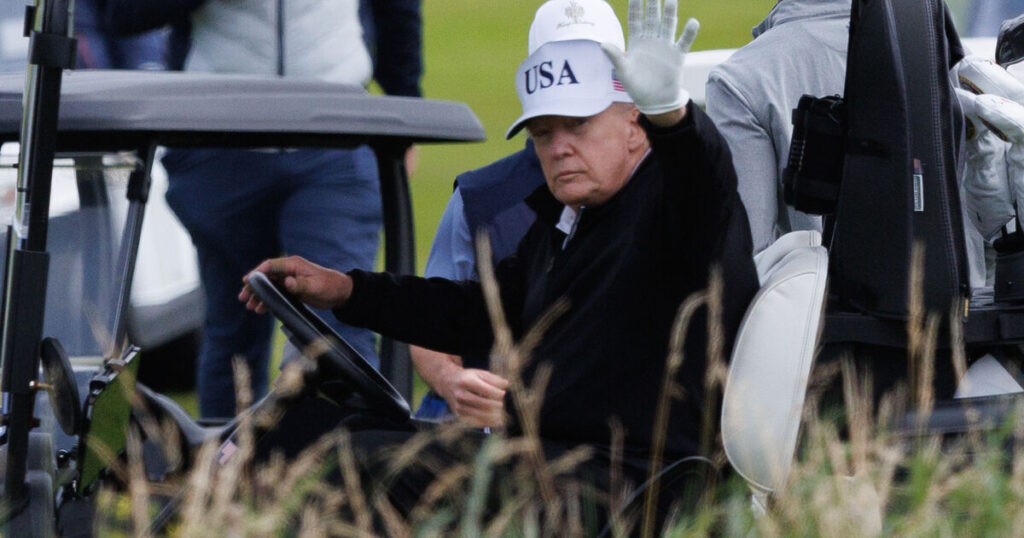Intensive negotiations continued on Saturday between the EU and the US ahead of a crucial meeting in Scotland between Donald Trump and European Commission President Ursula von der Leyen, aimed at preventing a potentially damaging trade war.
Trump spent the night at his Turnberry golf resort, a private family-owned property, using the opportunity to criticize European leaders on issues like wind turbines and immigration, asserting that Europe’s future depends on them “getting their act together.”
“I say two things to Europe. Stop the windmills. You’re ruining your countries. I really mean it, it’s so sad. You fly over and you see these windmills all over the place, ruining your beautiful fields and valleys and killing your birds,” he said. “On immigration, you better get your act together,” he said. “You’re not going to have Europe any more.”
On Saturday morning, he cancelled a scheduled press briefing, for which journalists had traveled on Air Force One, choosing instead to play golf at his seaside course, with music reportedly playing loudly from his golf cart.
According to Sky News, which was stationed near the course, the music included songs like Billy Joel’s Uptown Girl, Elaine Paige’s Memory, and Simon and Garfunkel’s Bridge over Troubled Water.
This four-day family visit to Scotland includes meetings with European leaders and British Prime Minister Keir Starmer, raising expectations of refined trade agreements with the EU and the UK.
Regarding the possibility of an EU trade deal, the US president mentioned “20 sticking points.” When questioned about their nature, he declined to elaborate, stating, “Well, I don’t want to tell you what the sticking points are.”
He described von der Leyen as a “highly respected woman” and expressed optimism about the Sunday meeting with the EU chief, giving the chances of a deal a “good 50-50” rating.
Von der Leyen and her staff are expected to arrive on Saturday, with European Trade Commissioner Maroš Šefčovič joining on Sunday morning.
The anticipated deal is slated to focus on a preliminary agreement regarding 15% tariff rates for various exports, including cars, while maintaining a 50% tariff on steel. A potential breakthrough on pharmaceuticals is also being discussed, possibly involving a 15% export rate.
Although this would deviate from the World Trade Organization’s policy of zero tariffs on medicines, it would be significantly less severe than the 200% tariff Trump had previously threatened to impose on pharmaceuticals earlier in the month.
The implementation of a 200% tariff would have triggered a major trade conflict affecting not just Ireland, with its many US-based multinational corporations, but also countries such as Germany, Denmark, Belgium, France, and Spain.
Von der Leyen’s spokesperson, Paula Pinho, commented: “Intensive negotiations at technical and political [level] have been ongoing between the EU and US. Leaders will now take stock and consider the scope for a balanced outcome that provides stability and predictability for businesses and consumers on both sides of the Atlantic.”
The meeting is reportedly set to take place in Aberdeenshire, followed by meetings with Starmer on Monday, with the hope of expanding upon the initial trade agreement reached in May.
Trump’s visit to Scotland has prompted the largest security operation since the death of Elizabeth II in 2022, with over 5,000 police and security personnel involved in the four-day event. Stringent measures are in place following the assassination attempt on the president a year prior.
High security fences surround the coastal golf course, with naval vessels patrolling the shoreline and security drones monitoring from above. A significant security detail was deployed around the resort early on Saturday.
This heightened security presence may foreshadow arrangements for US Vice President JD Vance and his family’s upcoming vacation in the Cotswolds in August, specifically in the village of Charlbury.
Local residents, who had opposed the expansion of Trump’s golf course in the past, have questioned who will bear the cost of the robust security measures.


